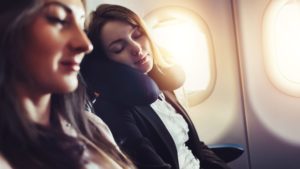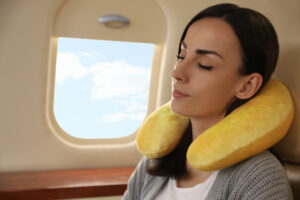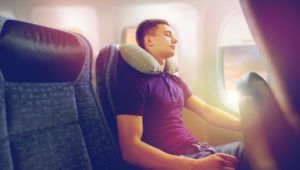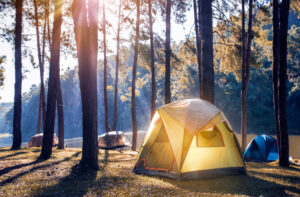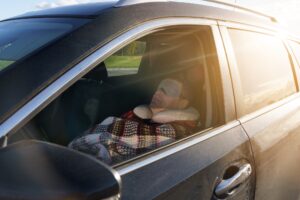How To Get a Good Night’s Sleep in a Hotel
Staying in a hotel can be restful or stressful. Individual experiences vary due to hotel location, amenities and services, or the reason for the stay. But whether you’re traveling solo for business, escaping for a romantic getaway with your partner, or bringing the whole family on vacation, perhaps one of the most important things you will do at your hotel is sleep. For that reason, a quiet, comfortable, and dark sleeping environment is ideal.
Even in the coziest suite, some people toss and turn trying to fall asleep. Researchers have observed sleep problems in people occurring during their first night adapting to a new environment, a phenomenon called the first night effect (FNE) . The FNE is characterized by difficulty falling asleep, as well as shorter overall sleep time and REM sleep time (the stage in which dreams occur).
The FNE could be the result of our bodies attempting to keep us safe. Studies show that people who are sleeping in a new place exhibit increased activity in the left hemisphere of the brain , an area that is expected to be more dormant when a person winds down for bed. Rather than allowing the body to sleep, this part of the brain remains alert and vigilant for signs of danger. This response may be triggered as a protection mechanism since increased vigilance allows a person to wake up faster in response to unexpected noise.
Do Some People Sleep Better in Hotels?
Oddly enough, some people experience the opposite of the first night effect and find themselves getting more restorative sleep while away from home. Why is it that some toss and turn adapting to a new environment, while others find hotel stays promote better sleep? Research suggests multiple factors affect how a person’s sleeping habits change in response to sleeping away from home.
One study examined groups of people who reported their regular insomnia symptoms improved during hotel stays . Researchers then compared this “recovery from home insomnia” group to the “travel insomnia” group — those who experienced new insomnia symptoms that they did not regularly experience at home. Findings indicated that the “travel insomnia” group comprised more business travelers than tourists, suggesting that tourism activities are accompanied by a sense of stress-relief and relaxation compared to business meetings and obligations.
Researchers also noted that morning types were more likely to report new insomnia symptoms at hotels than evening types. Evening types tend to have a more flexible sleeping schedule, which allows them to adapt more easily to a new environment. On the other hand, morning types tend to be more regimented and stick to regular schedules, so they may be more sensitive to disruptions from jet lag or environmental changes, such as an unfamiliar room.
Researchers also found that hotel satisfaction significantly affected the reported sleep quality of both groups. If you’re more sensitive to environmental changes, a hotel with the right amenities could improve your sleep quality and reduce disruptions.
Does It Get Easier to Sleep After the First Night?
For some, the first night effect can create a troublesome sleeping experience when they arrive at their destination. But, the silver lining to the first night effect is found in its name — research shows that sleep delays during the initial night of sleeping in a new environment improve over subsequent nights. So, if you struggle to get restful sleep the first night of your vacation or business trip, there’s a good chance your second night will be better.

Why Can’t I Sleep in My Hotel Room?
There could be a few reasons you’re struggling to fall asleep in your hotel room. The first night effect may be keeping you more alert and restless. You might be adjusting to jet lag. Or, if you’re traveling for business, you could be stressed about the obligations of your trip. While some of these factors are outside of your control, you may have options when it comes to your room and amenities, which can make a big difference in the sleep quality you experience during your trip.
A large study of hotel guests examined the most common causes of sleep disturbance at hotels and found that complaints ranged from poor pillow and mattress quality to high room temperature, street noise, unwanted light from windows, and ventilation system noise. If these factors stand between you and a good night’s sleep, consider requesting more than just new pillows — a room change may be in order!
Although it may seem like a hassle to move your things after you’ve settled, feeling well-rested is worth it. Requesting a room on a higher level and away from the lobby, elevators, and conference rooms can keep you away from excess noise. Also, a room on a recently renovated floor is more likely to have a newer mattress. Unsurprisingly, a hotel’s study on mattress quality found significant correlations between mattress quality and sleep quality reported by guests. So, don’t hesitate to make your needs known to the concierge if a room change could improve your sleep.
What Can I Do to Sleep Better in Hotels?
There are many actions you can take to help you sleep better in hotels. Before your stay, learn what to expect by searching your hotel’s reviews. Look for negative reviews that specifically mention pillow or mattress quality, noise, and temperature issues. Consider checking if your hotel is in an urban area with a lot of street noise. When it comes to room choice, consider requesting a room on a higher level, away from the noise of the street, elevators, and conference rooms. Ask if the rooms feature black-out shades or curtains, allowing you to make the room dark enough for comfortable sleep or wear a comfortable eye mask to block out the light.
If you require a certain type of pillow, bring your own from home to ensure you will be comfortable. Other familiar items from home may also help you adjust to the new environment of a hotel room. Pack something sentimental to keep on your nightstand, such as a photo of loved ones, or spritz your hotel room with a fragrance you use at home. If you’re worried about noise, consider bringing a white noise machine or ear plugs to mask disruptive sounds.
When you arrive at your hotel, make sure your room is comfortable for sleeping. Check your pillows, mattress, and curtains to make sure you’re satisfied. Then, set a cool room temperature — between 60-67 degrees Fahrenheit — ideal for sleeping. If you’re still feeling restless, anxious, or stressed on your night away, try some relaxation techniques to calm your body and promote better sleep. Substituting a deep breathing exercise for scrolling through your phone, for example, is one easy way to improve your sleep quality and cardiovascular function .
Finally, keep the room as dim as possible for at least an hour before sleep, ideally longer, and minimize device use. Phones emit alerting blue light so use them sparingly with the night setting on or try and avoid them completely in bed.

Still have questions? Ask our community!
Join our Sleep Care Community — a trusted hub of sleep health professionals, product specialists, and people just like you. Whether you need expert sleep advice for your insomnia or you’re searching for the perfect mattress, we’ve got you covered. Get personalized guidance from the experts who know sleep best.
References
7 Sources
-
Tamaki, M., Nittono, H., Hayashi, M., & Hori, T. (2005). Examination of the first-night effect during the sleep-onset period. Sleep, 28(2), 195–202.
https://pubmed.ncbi.nlm.nih.gov/16171243/ -
Collins, F. (2016, April 26). Explaining the traveler’s first-night sleep problem. NIH Director’s Blog., Retrieved January 28, 2021, from
https://directorsblog.nih.gov/2016/04/26/explaining-the-travelers-first-night-sleep-problem/ -
Tamaki, M., Bang, J. W., Watanabe, T., & Sasaki, Y. (2016). Night watch in one brain hemisphere during sleep associated with the first-night effect in humans. Current Biology, 26(9), 1190–1194.
https://pubmed.ncbi.nlm.nih.gov/27112296/ -
Xiong, W., Fan, F., & Qi, H. (2020). Effects of environmental change on travelers’ sleep health: Identifying risk and protective factors. Frontiers in Psychology, 11, 724.
https://www.ncbi.nlm.nih.gov/pmc/articles/PMC7237733/ -
Pallesen, S., Larsen, S., & Bjorvatn, B. (2015). “I wish I’d slept better in that hotel” – Guest’s’ self-reported sleep patterns in hotels. Scandinavian Journal of Hospitality and Tourism.
https://www.tandfonline.com/doi/abs/10.1080/15022250.2015.1074938 -
Enck, P., Walten, T., & Traue, H. C. (1999). Associations between back pain, quality of sleep and quality of mattresses. Double-blind pilot study with hotel guests. Schmerz, 13(3), 205–207.
https://pubmed.ncbi.nlm.nih.gov/12799934/ -
Laborde, S., Hosang, T., Mosley, E., & Dosseville, F. (2019). Influence of a 30-day slow-paced breathing intervention compared to social media use on subjective sleep quality and cardiac vagal activity. Journal of Clinical Medicine, 8(2), 193.
https://www.ncbi.nlm.nih.gov/pmc/articles/PMC6406675/


